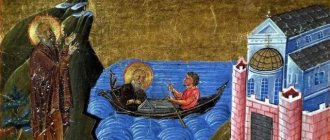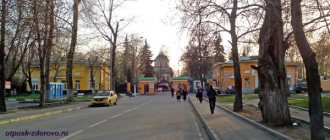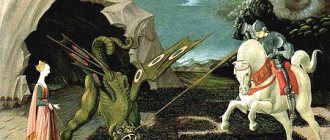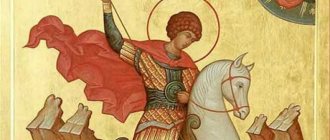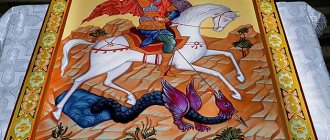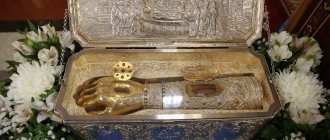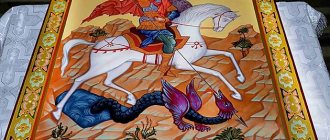Venerable George the Confessor of Danilovsky the Wonderworker
Reverend Confessor Georgy (Gerasim Dmitrievich Lavrov) was born on February 28, 1868 in the village of Kasimovka, Lama volost, Yeletsky district, Oryol province, into a peasant family. From his home, Gerasim brought deep faith in God and love for the Holy Church.
July 4 is the day of memory of the Reverend Confessor Archimandrite Georgy (Lavrov)
Before the Danilov Monastery, for 24 years, from 1890 to 1914, Fr. George labored in Optina Pustyn. instructions to enter Optina in childhood from the shrine of St. Sergius: the boy prayed that the monk would grant him happiness in life, and in response he heard in his soul the words: “Go to Optina.”
In 1890, Gerasim went on foot to Optina. A month later he arrived at the monastery and was accepted for voluntary obedience. On October 10, 1898, he was identified as a member of the brotherhood of the monastery, on June 23, 1899, he was tonsured a monk with the name George (in honor of the Holy Great Martyr George) and on October 24, 1902, he was ordained a hierodeacon.
In the monastery, Father George performed mainly economic obediences. External labors were combined with spiritual work, with complete, unreasoning obedience to the elders.
Thus, the future confessor of Christ grew from strength to strength (Eph. 4:13), and by the time the time came to leave the walls of Optina Pustyn, he was already a proven monk, ready to work in the field of Christ.
On January 2, 1914, Hierodeacon Georgy was transferred to the Meshchovsky St. George Monastery and by the Decree of the Holy Synod of October 31, 1915, he was appointed to the position of rector with ordination to the rank of hieromonk. On January 3 of the same year he was awarded a gaiter.
Hieromonk Georgy ruled the Meshchovsky monastery during the difficult times of the world war and revolution. In this he was helped by practical experience and the ability to manage wisely, acquired in Optina, kindness and wisdom in relations with people. On November 2, 1917, for his work as a rector, Father George was awarded the pectoral cross by the Holy Synod. In the same year, the Meshchovo St. George Monastery was “given the blessing of the Holy Synod with the issuance of a certificate to this effect... for the merits... of the monastery due to wartime circumstances.”
On December 9, 1918, Hieromonk George was arrested, and on June 4, 1919, he was sentenced to death. The night before the execution, while praying, he had a vision that he and six of his fellow prisoners, also sentenced to death, would remain alive. And so, by the grace of God, it happened. To carry out the sentence, death row prisoners were placed in a carriage.
At the Tikhonova Pustyn station, where this carriage arrived, it was mistakenly attached to a train going not to Kaluga, as expected, but to Moscow, where the prisoners were transported to the Tagansk prison. While the circumstances were being clarified, an amnesty was declared, and everyone remained alive. According to the amnesty of the All-Russian Central Executive Committee of November 5, 1919, the execution was replaced by five years of imprisonment, which Father Georgy served in Butyrskaya and Taganskaya prisons.
While in prison, Father Georgy served as a nurse and was a comforting elder for many prisoners. He did not spare himself, alleviating the physical and mental suffering of prisoners.
Venerable George the Confessor of Danilovsky the Wonderworker
In the Tagansk prison at that time there were the Hieromartyr Metropolitan of Kazan and Sviyazhsk Kirill (Smirnov, † November 7, 1937) and the rector of the Moscow Danilov Monastery, Archbishop Theodore (Pozdeevsky, † October 10, 1937). The virtues of Hieromonk George were not hidden from the bishop-confessors, and this was of great importance for his future life. Metropolitan Kirill, noticing in him the gracious gift of reasoning and love, blessed Father George for eldership, and Archbishop Theodore accepted him into the Danilov Monastery in 1922, taking the elder “on bail.”
So in 1922, Hieromonk George was released and became a monk of the Danilov Monastery, where he was appointed to the position of fraternal confessor. His obedience was also to accept the confession of parishioners.
Muscovites loved Father Danilov and revered him for his gift of consolation and insight. Among his spiritual children there were educated people, prominent scientists, and ordinary people; the old man was always surrounded by youth. Archimandrite George was also visited by the bishops who lived in Danilov at that time. Many of the elder’s spiritual children suffered persecution for their faith. Among them are the holy martyrs Metropolitan Seraphim (Chichagov), Archpriest Vladimir Ambartsumov, Hieromonk Pavel (Troitsky) and others.
Elder George had an extraordinary gift of love, kindness, mercy, and helped people with advice, deeds, and prayer. There are many testimonies of his miraculous prayerful help to those in need.
Archimandrite George paid exceptional attention to youth. “A person’s path is formed from a young age, and then it is difficult to change it,” he said. The elder directed many young men and women to the path of faith, which in those years was confessional.
On May 19, 1928, Archimandrite Georgy was arrested and sent to Butyrka prison. On June 12, 1928, an indictment was drawn up under Art. 58/10 CC.
In solitary confinement in prison, prayer was the source of spiritual strength for the elder. During interrogations, he behaved calmly and courageously.
On June 15, 1928, a Special Meeting of the OGPU Collegium decided to exile Archimandrite George to Kazakhstan, to Uralsk, for a period of three years. Having reached Uralsk, he received a new assignment in the wilderness - in the village of Kara-Tyube, located 100 km from the regional center of Dzhambeity.
The exiled share of Archimandrite George was shared by Tatyana Borisovna Melnikova, who accompanied the priest into exile and was with him until his last hour. Some time later, Elena Vladimirovna Chicherina (later nun Ekaterina) arrived in Kara-Tyube.
From time to time the elder was visited by his spiritual children. The spiritual children of Father George, young medical specialists who chose this distant land to be close to their elder, also settled in Dzhambeit.
In Kara-Tyube, Father George and his novices settled in a wretched fanza (Kyrgyz clay house) on the edge of the village. At first they ate mainly on what the spiritual children sent from Moscow. Soon they got a cow and their milk appeared.
In the house of the exiled priest, prayer did not stop. The house church was built in the main room where Father George lived. The throne was made by himself from parcel boxes; the antimension contained particles of the holy relics of Equal-to-the-Apostles Constantine and Helen. Divine services were held on all holidays, and during Great Lent daily, morning and evening. The daily life was always read.
During the years of Father George's stay in Kara-Tyube, there were several unpleasant incidents, which, by the grace of God, ended happily. After these events, the Kazakhs said respectfully, explaining their happy outcome: “The Russian mullah prayed to God.”
While in exile, Archimandrite George fell seriously ill. Doctor Sofya Maksimovna Tarasova (later nun Agapita), called from Dzhambeita, diagnosed laryngeal cancer. It was necessary to return to Russia; began to apply for a trip to Moscow. However, the authorities delayed the release, and the old man, exhausted by illness, was forced to live in Kazakhstan for another extra and the most difficult year he lived here.
On May 15, 1932, documents were finally received for release without the right to reside in Moscow and 12 other cities, with attachment to a specific place of residence for three years. Of the possible cities, Father Georgy chose Nizhny Novgorod, saying, remembering Minin and Pozharsky: “Salvation from Nizhny.”
In Nizhny Novgorod, the elder settled in a small house, standing among a grove of white-trunked birches that he loved. The last days of the elder’s confessional life were passing. Close spiritual children arrived from Moscow. The meeting with them revived Father George, and he was able to talk to each one individually.
July 4 (new style), Father George talked for a long time with his spiritual son Archimandrite Sergius (Voskresensky, † April 16, 1944), the future metropolitan, and was interested in church affairs. Tired of the conversation, he dozed off. Only Tatyana Melnikova remained in the room. Noticing that the elder’s breathing had changed, she called Father Sergius. He immediately came with the Holy Gifts. The elder took the Chalice, accepted the Holy Gifts and so, with the Chalice in his hands, reposed before God.
The death of the priest was reported to Moscow; spiritual children, whoever could, went to Nizhny Novgorod (then the city of Gorky). The funeral service was scheduled for July 6, the day of the Vladimir Icon of the Mother of God, especially revered by Father George. The funeral service was performed by Archimandrite Sergius, co-served by numerous clergy. Despite the fact that Father George did not live long in Nizhny Novgorod, rumors about the righteous man spread among the people, and many believing local residents came to the funeral service.
When the hearse entered the cemetery gates, the bell struck and rang rhythmically until the deceased was brought into the church. Father George was buried near the altar of the cemetery Old Believer church.
There are many posthumous evidences that the elder acquired boldness before God. In fulfillment of his promise, he did not and does not leave now the gracious help of his spiritual children and everyone who turns to him in prayer with faith.
At the Jubilee Council of Bishops of the Russian Orthodox Church in 2000, Archimandrite George was glorified as one of the holy new martyrs and confessors of Russia. On October 11, 2000, his venerable relics were found. Now they rest in the Intercession Church of the Danilov Monastery.
Prayer by Rev. Georgy Danilovsky
O glorious servant of God, Reverend Father George, praise and adornment to Danilov’s monastery!
From your youth you desired the monastic life, and labored in it,
You acquired the love of Christ, and you were a good shepherd of those who came to you;
After being exiled and enduring much sorrow, you inherited the Kingdom of Heaven.
And now look upon us, your children, who pray to you, and guide our souls to salvation;
Confirm our holy monastery with peace and piety and strengthen us in the more Orthodox faith,
Let us please God through a pure life; to Him belongs all glory, honor and worship forever.
Amen
Which icon will protect you
Those born from December 22 to January 20
will be protected by the “Sovereign” icon of the Mother of God, and their guardian angels are Saint Sylvester and Venerable Seraphim of Sarov.
Born from January 21 to February 20
guarded by Saints Athanasius and Cyril,
and they will be protected by the icons of the Mother of God “Vladimir”
and "The Burning Bush"
The icon of the Iveron Mother of God is the intercessor of those born from February 21 to March 20.
Their guardian angels are Saints Alexius and Milentius of Antioch.
Save yourself Three prayers that will help you in all good endeavors
Born from March 21 to April 20
we must ask for protection from the icon of the Kazan Mother of God,
and they are protected by Saints Sophronius and Innocent of Irkutsk, as well as George the Confessor.
Icons “Helper of Sinners”
and Iveron Mother of God
will protect those born from April 21 to May 20. Saints Stephen and Tamara, Apostle John the Theologian are their guardian angels.
If your birthday falls between May 21 and June 21
we must ask for protection from the icons of Our Lady “Seeking the Lost”
, "The Burning Bush"
and "Vladimirskaya"
Protected by saints Alexei of Moscow and Constantine.
